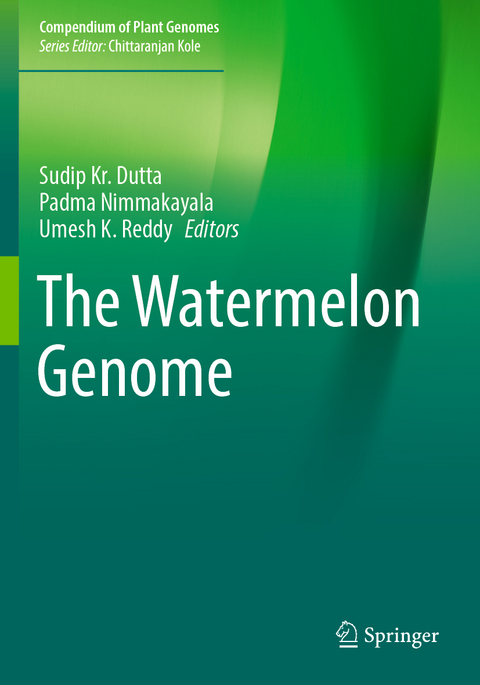
The Watermelon Genome
Springer International Publishing (Verlag)
978-3-031-34718-4 (ISBN)
Dr. Sudip Kr. Dutta is a scientist of Horticulture at Indian Council of Agricultural Research (ICAR), New Delhi, India since 2011. He obtained his PhD in Horticulture in 2011. He has been working in the various horticultural crops for 14 years. His main interest in the last few years is in the genomic and transcriptomic analysis of genes belonging to the various pathways differentially expressed in watermelon. He studied the transcriptomal changes in reciprocal grafts involving watermelon (Citrulluslanatus (Thunb.) and bottle gourd [Lagenaria siceraria (Molina) Standl.] and also revealed the molecular mechanisms involved in fruit size, rind toughness and total soluble solids. From 2016-2017 (as DBT, Govt. of India, Associate) he was at Department of Biology, Gus R. Douglass Institute, West Virginia State University, Institute, WV, 25112-1000, USA. There he studied genome-wide identification and gene expression pattern of ABC transporter gene family in Capsicum spp. Currently, he worksin the Department of Horticulture at ICAR research complex for North Eastern Hill Region, Sikkim Center, Sikkim, India where he works on application of new molecular tools to accelerate breeding in horticultural crops.
Dr. Umesh K. Reddy is a Professor of Genetics and Genomics at the Department of Biology, at West Virginia State University. Dr. Reddy is a globally recognized genomic researcher in cucurbits with special reference to watermelon and pumpkin. His two decades of genomic research resulted in several high-impact peer journal articles including Plant Journal, Journal of Experimental Botany, Plant Molecular Biology, and BMC Genomics to name some. His research entitles the evolution of cultivars, nutraceuticals, evolution, and abiotic resistance with special reference to heavy metals. He teaches Genetics, Biotechniques, and Crop Diversity and Breeding.
Dr. Padma Nimmakayala is a Professor of Plant Breeding and Genetics at the Department of Biology, at WestVirginia State University. She focuses on breeding, genetics, and genomics in watermelons and peppers. She aims in developing molecular markers for fruit quality, yield, and mine site adaptation, and integrate these tools for genome-assisted breeding. She is in the process of developing telomere-to-telomere sequences for pumpkin, melon, and bell pepper. She has also identified pumpkin, pepper, and watermelon types that have high antioxidants and flavonoids that can be used for nutraceutical purposes. Presently, little is known about the genes controlling flavor and fruit architecture in watermelon germplasm that is relevant to breeding. She has already generated extensive SNP data that can make Genome-wide Association Study (GWAS) feasible to identify molecular markers linked to phytonutrients and fruit architecture.Origin of watermelon.- Whole genome sequencing of watermelon and other relevant genomic resources.- Watermelon Genetic Resources and Diversity.- Watermelon genomic resources for disease resistance.- - The NLR family of disease resistance genes in cultivated watermelon and other cucurbits: opportunities and challenges.- Mapping of economic and quality related loci in watermelon.- Genetics and genomics of fruit and quality traits of watermelon.- Genetics and genomics of host resistance and develop disease tolerant cultivars of watermelon.- Molecular and Metabolic Regulation of Nutraceuticals in Watermelon.- Challenges of Traditional breeding in watermelon.
| Erscheinungsdatum | 30.08.2024 |
|---|---|
| Reihe/Serie | Compendium of Plant Genomes |
| Zusatzinfo | V, 172 p. 33 illus., 31 illus. in color. |
| Verlagsort | Cham |
| Sprache | englisch |
| Maße | 178 x 254 mm |
| Gewicht | 351 g |
| Themenwelt | Naturwissenschaften ► Biologie ► Botanik |
| Naturwissenschaften ► Biologie ► Genetik / Molekularbiologie | |
| Technik ► Umwelttechnik / Biotechnologie | |
| Schlagworte | Molecular Breeding • Transcriptomics • Watermelon disease resistance • Watermelon genetic resources • Watermelon genome |
| ISBN-10 | 3-031-34718-8 / 3031347188 |
| ISBN-13 | 978-3-031-34718-4 / 9783031347184 |
| Zustand | Neuware |
| Informationen gemäß Produktsicherheitsverordnung (GPSR) | |
| Haben Sie eine Frage zum Produkt? |
aus dem Bereich


